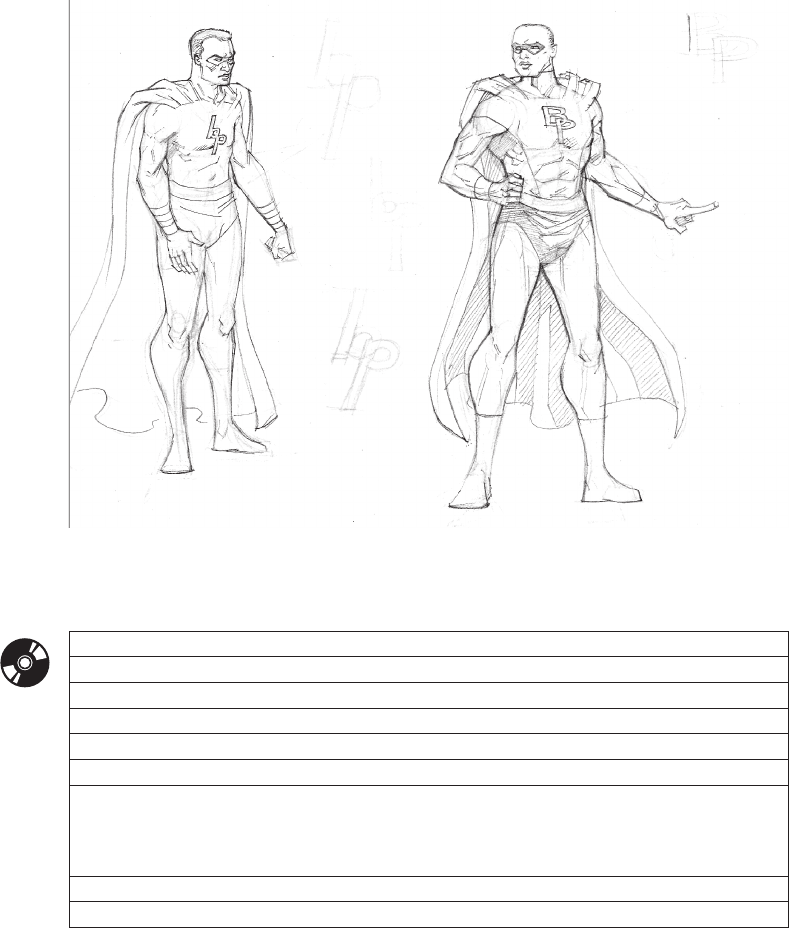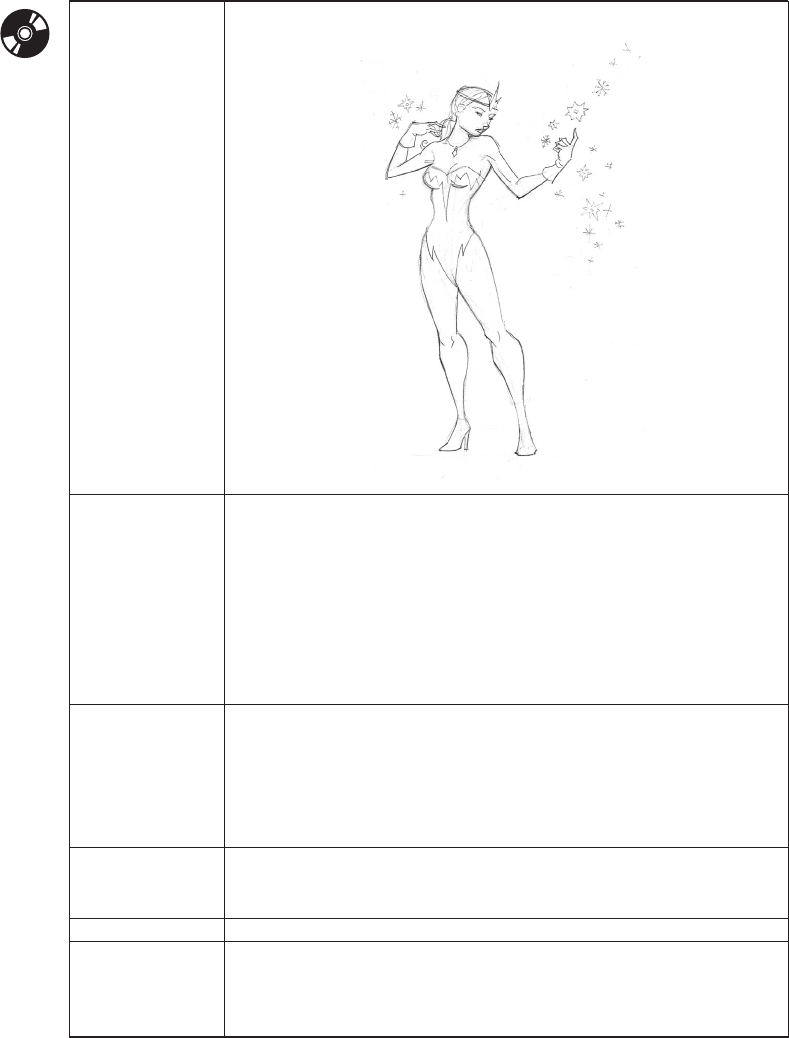172 THE GAME PRODUCTION HANDBOOK, 2/E
Preparing Character Descriptions
Character descriptions give a clear idea of who the character is and how he might
sound. These notes are useful for actors auditioning for a particular role, as they
don’t have to guess who the character is and can focus on creating a voice that
defines the character. The descriptions also help a casting directing further nar-
row the field on the type of actor needed for the role.
Figure 10.6 is one example of a character description template. A picture is
invaluable also as it gives a clear idea of the type of actor needed for the role.
Other key information, such as gender, age, and ethnicity is described to further
narrow the field. A brief description of the voice tone and speech patterns is
helpful. The actor voicing the lines can use this information to determine how
the character will sound. The last part presents information on where the char-
acter appears and his major role in the game. Generally, this type of description
is useful for a game in which there is some freedom in how the lines are read.
Figure 10.7 is another example of a character description. This example
takes a different approach in that detailed information is presented about the
character’s background and personality. This background information might not
even appear in the game, but it presents a more fully fleshed-out character.
A voice description presents the character’s tone of voice, speech patterns,
and accents. The references section includes references to famous actors who
have a voice similar to what the character should sound like in the game. These
references are very helpful for the casting director and for actors.
The sample dialogue section lists actual dialogue the character will be speak-
ing in the game. Such samples can be used when the actors are creating audition
tapes. A better judgment can be made on how an actor will sound for the role if
he is auditioning with dialogue that will actually be used in the game, and if the
dialogue is the same between different candidates.
This type of character description works well for major characters that need
to be more defined. The detailed description also works well for characters that
have appeared in previous incarnations of the game and have developed their
personalities and backgrounds within the game universe.
Auditions
Auditions give you an opportunity to hear several different actors read for each
character. Depending on how the auditions are set up, you also will have an op-
portunity to see how well the actors take direction, how wide their ranges are,
and whether they are capable of doing multiple voices. The recording studio will
handle the auditions or recommend a casting agency which does them.
If there is no time or money to set up a separate audition, the actor selec-
tions can be made by listening to an actor’s voiceover reel. Doing so is not rec-
ommended, as it does not allow you to hear exactly how the actor is going to

VOICEOVER 173
interpret your game’s character. You will have to trust that the actor is right for
the part based on non-game-specific information.
The basic audition process involves scheduling time for the actors to come to
the studio to record some sample dialogue from the game. When they arrive at
the studio, they are presented with character descriptions and a voiceover script.
Name: Bullet Point
Age: 25 years
Gender: Male
Type: Superhuman
Role: Hero; member of Justice Unit
Voice: Strong, confident voice
Speech Patterns: Bullet Point is a marketing executive, and has a strong, clear voice
that projects well. In conversation, he's long-winded and over-analytical, but in combat,
he is quick and to the point. He tends to yell during fights, adopting a military tone of
voice when giving orders.
Other Information ??* Player character
* New to the team, allows player to experience world of Justice Unit through his eyes
O
N
T
H
E
C
D
FIGURE 10.6 Character description example.

174 THE GAME PRODUCTION HANDBOOK, 2/E
O
N
T
H
E
C
D
Name
Ice Queen (real name Melanie Cole)
Background
Born in 1979, Melanie grew up in Virginia Beach, VA. Her father was an architect
and her mother worked as a receptionist. An average student, Melanie studied at
Tidewater Community College for two years before transferring to Old Dominion
University, where she graduated with a degree in History in 2002. Melanie's
parents died in 2004, when her Sentience manifested itself. The freezing blast
leveled three homes, killing a total of seven people. Horrified, Melanie fled, but
was later apprehended by police. Later that day, her Sentience erupted again,
destroying the police station and killing several officers. Bulletpoint and The
Sensei were called in, and were able to incapacitate Melanie. She was taken to
Masada, where the Justice Division was able to train her in the use of her powers.
Since then, Melanie has learned to control her Sentience, and has proven herself a
capable member of the Justice Division.
Personality
Melanie is extremely distant, and has difficulty forming lasting relationships with
people. Though she has fought beside the other members of the Justice Division
for two years, she still refers to them by their code names, and refuses to socialize
outside of work. Members of the Division have joked that her most powerful
offensive weapon is the Cold Shoulder. She still grieves for her family, and feels a
profound sense of remorse for the lives that she ended, even though she's aware that
the deaths were accidental. Despite hundreds of hours of training, Melanie fears
that she may lose control of her Sentience, resulting in more innocent deaths.
Voice
Melanie's voice is low and firm. She only raises her voice when chastising or
disagreeing with someone. She often sounds arch or condescending, particularly
when explaining things to others, and can come across as callous when delivering
bad news. She speaks unaccented English.
References
Gillian Anderson (The X-Files)
Sample Dialog
"That's really too bad, but that's not our problem. We're here to apprehend
Zomborg, and that's all I'm really interested in talking about."
"What part of 'immediately' did you not understand? You were expected a while
ago. Get in there and do your job.""I don't really have time to deal with this.
The Division doesn't have time for this either. Suck it up, or quit."
FIGURE 10.7 Another character description example.
VOICEOVER 175
The voiceover director, if one is hired, will take them through the script and
prep them for the audition. The actor will record the sample dialogue, and these
lines will be processed and made available for the developer. The developer then
will make final actor selections based on the audition tapes.
To successfully pick the right actor during the audition process, keep several
things in mind. First, someone from the development team should be present ei-
ther on the phone or in person at the auditions. Having someone from the team
participate in the auditioning process is key, since they will be able to advise
the voiceover director on what specific characteristics they are looking for from
the actor. For example, if the character has a Russian accent, the developer can
clarify whether this accent should be heavy, light, exaggerated, or more realistic.
This way, when the developer is reviewing the auditions, he does not have to
wonder whether the actor who used a light Russian accent is capable of doing a
heavier, more realistic accent.
The other benefit of having someone from the team at the audition is that
he will have firsthand experience of what it will be like to work with a particu-
lar actor. For example, the actor might need a lot of detailed direction, might
be difficult to work with, or might not have a broad enough acting range for a
pivotal character. All of this information is useful when making the final actor
selections.
If someone from the team is not available to attend the audition, get feed-
back from the recording studio on the actors. Recording studios tend to work
with the same group of actors over and over and will be able to give valuable
feedback on an actor’s ability to deliver what is being requested. They will also
have feedback on how well the actor takes direction.
Second, make sure that the sample dialogue for the audition reflects the
type of dialogue that actually will be in the final version of the game. If working
on a realistic military game, include sample dialogue that reflects how soldiers
speak. Also, the dialogue should include a wide range of emotions, volumes,
and lengths for the actor to record. For example, include dialogue that is con-
versational, angry, shouted, whispered, happy, and so on. Also include dialogue
that is a short in-game comment—“area secured”—and longer dialogue made of
several sentences that might appear in a cinematic. This wide variety of sample
dialogue will give you a better idea of how well the actor fits the character.
Third, don’t be afraid to request that additional actors are called in for audi-
tions. If you don’t hear an actor who is suitable for the character you are trying
to cast in the first round of auditions, call in another group of actors to audition.
Recording voiceover is very expensive, and it is better to find the right person for
the role instead of having to recast the part later.
Auditions should be done well in advance of the actual recording session
so there is time to choose the actors and book their time. Please refer back to
Figure 10.4 for a general timetable for the auditions.
176 THE GAME PRODUCTION HANDBOOK, 2/E
Selecting and Booking Actors
After the audition tapes are complete and handed off to you for review, the final
actor selections must be made. If several people have a stake in which actor is
chosen for a particular role, you will want to listen to the tapes together and de-
termine who to cast. This process can be frustrating and laborious, especially if
everyone has different opinions as to what they are looking for in the character.
This challenge is where the character descriptions become useful: if the descrip-
tions are detailed enough, everyone should have a similar understanding of how
the character will sound. If your team is not in agreement on the basic character
description, you may find it difficult to agree on an actor.
Although your main focus is to get the right actor for the character, several
other vocal qualities besides acting ability must be considered when evaluating
the audition tapes:
Enunciation: The words must be clearly articulated and free of any mouth
noises, such as pops, clicks, swallows, and lip-smacking. Also listen to how
the sibilants sound; some actors pronounce words with an “S” or “P” that is
too hard or soft. These types of speech patterns might be difficult to mini-
mize in the recording session.
Breathing patterns: Listen to how the actor breathes when speaking. If he
takes loud gulps of air when reading sentences, they will be audible in the
recordings. A good sound editor can minimize some of the breaths if they
are taken during logical breaks in the dialogue.
Pitch: Determine whether the actor’s pitch is a good match for the game.
If the pitch is too high and squeaky or too low and gravelly, it will be dif-
ficult for players to understand key information. An actor with a wide range
should not have a problem with pitching his voice appropriately. However,
if his range is not very broad, it will be difficult for him to change the natural
pitch of his voice.
Cadence: Listen to the rhythm of the actor’s speech. Does it sound natural
or like a sing-song voice? A character with an unusual cadence to his voice is
not a problem. However, it can be problematic if the actor naturally has an
unusual cadence.
When a final decision has been made for all the actors, communicate your
choices to the sound studio. They will take this list and schedule the actors for
the session. If you are scheduling the actors yourself, first schedule the actors on
“avail” and then do the final booking after the recording schedule is confirmed
with the sound studio. Avail means the actor is available for the recording ses-
sion but is not fully committed; it is equivalent to penciling something in on a
schedule. No money is owed to actors on avail. Book means the actor is fully
..................Content has been hidden....................
You can't read the all page of ebook, please click here login for view all page.
